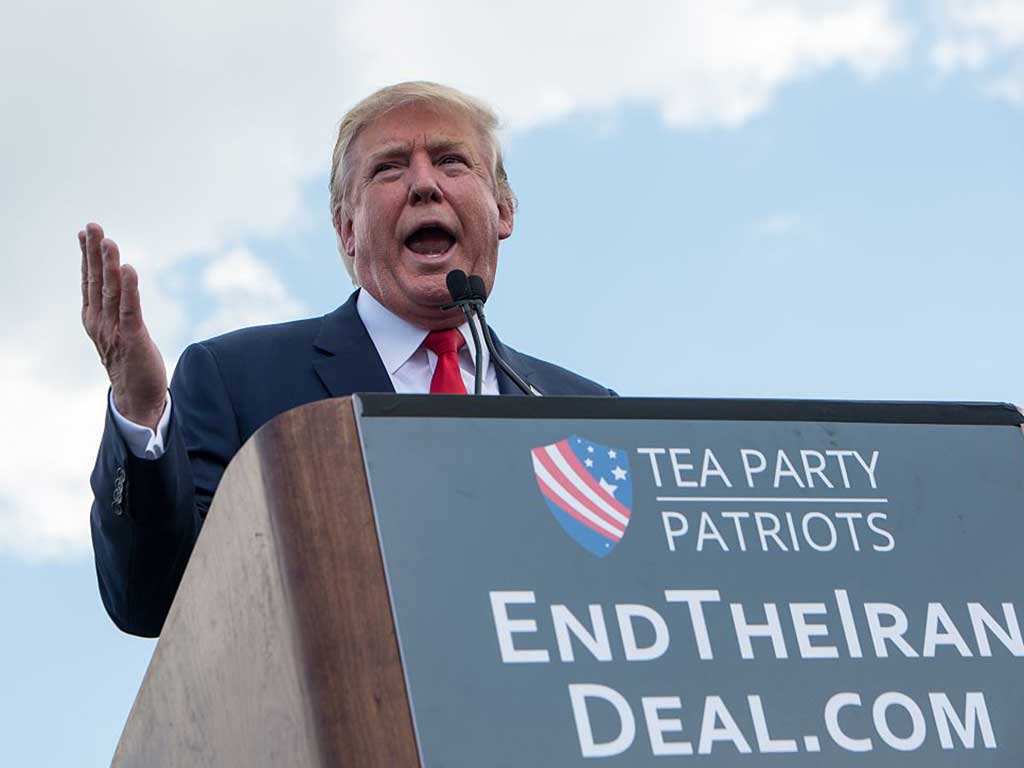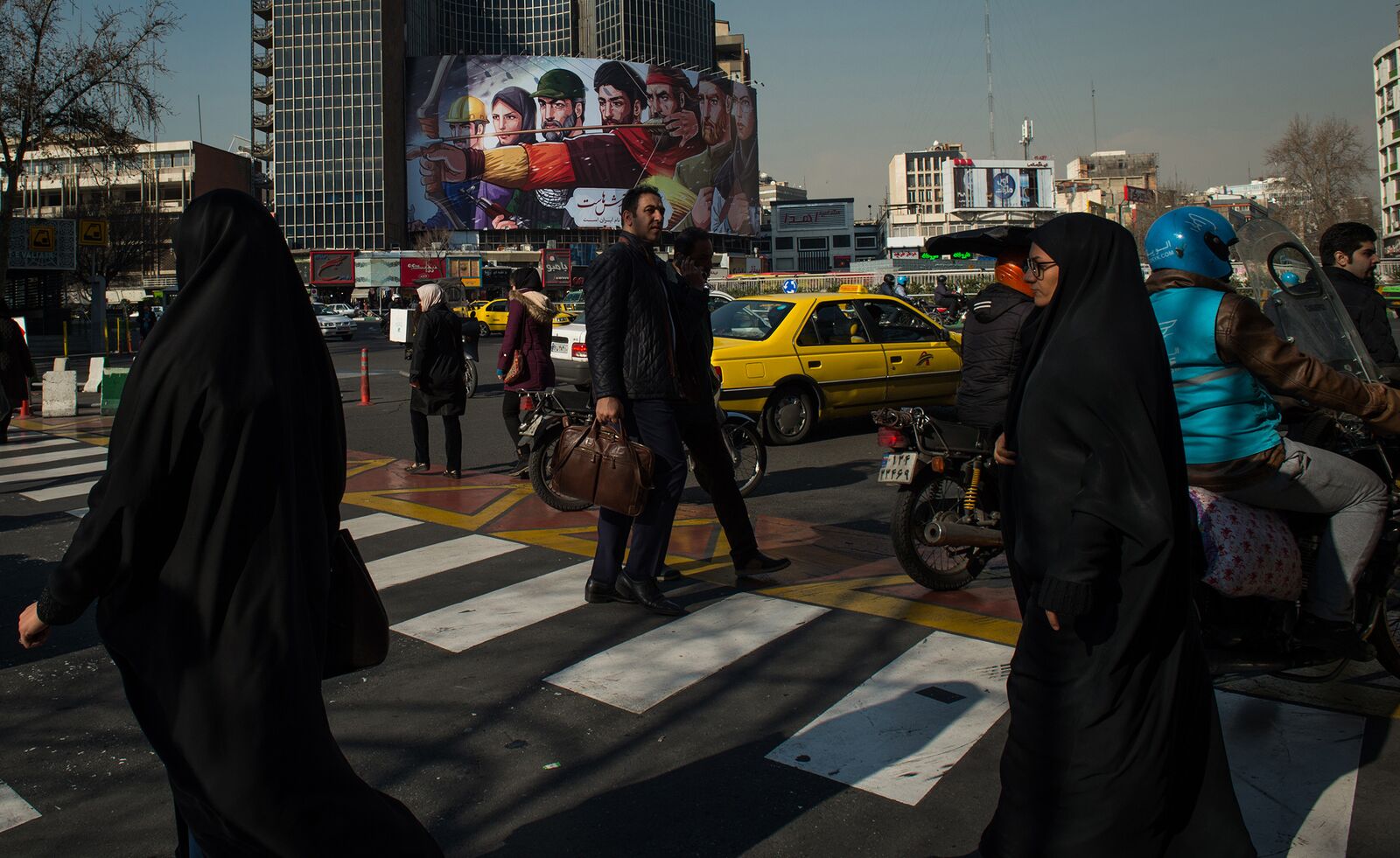 What’s at Stake If Trump Kills the Iran Nuclear Deal?
What’s at Stake If Trump Kills the Iran Nuclear Deal?
Lin Noueihed More stories by Lin Noueihed
- From oil to business to politics, the impact could be global
- Trump has May 12 deadline for decision on sanctions waiver

U.S. President Donald Trump has until May 12 to decide whether to perhaps fatally undermine a years-in-the-making nuclear deal with Iran, with the consequences likely to be felt from Middle East war zones to oil markets. If the U.S. refuses to continue to waive sanctions under the six-nation agreement reached in 2015, there’s a real threat Iran will also walk away. European powers are scrambling to persuade Trump to preserve the agreement, with German Chancellor Angela Merkel in Washington on Friday on the heels of French President Emmanuel Macron. So what’s at stake if the U.S. withdraws?
A recent Bloomberg survey predicted Iranian exports would be cut by 500,000 barrels a day. Iran is currently shipping just over 2 million barrels a day. More than half of that goes to China and India, while European Union nations currently buy about a quarter.
Although America purchases no Iranian oil, that might not matter. If U.S. sanctions put banks, shipping companies, refiners, insurers and ports at risk of losing access to the global banking system, they would have little option but to end their involvement with Iran. Much depends on whether Trump offers waivers and exemptions.
It’s not just companies involved in Iran that are worried. Privately, business leaders increasingly fret about the growing risk of conflict in the region if Iran resumes uranium enrichment in response to a U.S. withdrawal -- and what that could mean for world trade.
Among the larger deals at stake:
Russia is already fighting, and winning, on the same side as Iran in the Syria conflict. And cold feet among European and U.S. investors could herald a new boom for some Chinese companies, already major investors in Iran, where they have signed multi-billion dollar agreements in the oil, industrial and transportation sectors.
North Korea, which does have a nuclear arsenal, will be watching developments closely. Ditching a deal the U.S. helped shape could undermine American credibility at the negotiating table as it seeks denuclearization in the Korean peninsula. Some analysts say the upcoming talks with North Korean leader Kim Jong Un might be weighing on Trump -- and leave him more inclined to preserve Iran’s agreement.
Hardliners, who warned through years of talks that the U.S. was not a trustworthy partner, would emerge strengthened. There are also signs that the attitudes of ordinary Iranians, many of whom welcomed a deal they hoped would bring prosperity, are hardening.
“If the U.S. doesn’t stick by its obligations then it’ll go back to before and we will start enriching uranium,” Morteza, an unemployed Tehran resident, said. “It’s Iran’s right to do so, because they’re the ones violating it, not us.”
The potential for a broader conflict is compounded by the war in Syria, which has already drawn in Iran, Lebanon’s Hezbollah, Russia, the U.S., Turkey and Israel.
— With assistance by Stuart Wallace
Oil Markets
A “snap-back” in Iran sanctions by the U.S. would almost certainly reduce Iran’s oil exports, further stretching an oil market that’s seen prices rise 11 percent this year. What’s more uncertain is exactly how far shipments would fall.A recent Bloomberg survey predicted Iranian exports would be cut by 500,000 barrels a day. Iran is currently shipping just over 2 million barrels a day. More than half of that goes to China and India, while European Union nations currently buy about a quarter.
Although America purchases no Iranian oil, that might not matter. If U.S. sanctions put banks, shipping companies, refiners, insurers and ports at risk of losing access to the global banking system, they would have little option but to end their involvement with Iran. Much depends on whether Trump offers waivers and exemptions.
Doing Business
A resumption in U.S. sanctions could derail tens of billions of dollars in business deals. While a U.S. exit may not render signed deals illegal, new sanctions would make it risky for international companies to continue working in Iran due to potential ramifications for their U.S. business or banking transactions.It’s not just companies involved in Iran that are worried. Privately, business leaders increasingly fret about the growing risk of conflict in the region if Iran resumes uranium enrichment in response to a U.S. withdrawal -- and what that could mean for world trade.
Among the larger deals at stake:
- Airbus Group SE signed off on a contract with Iran for 100 jetliners worth about $19 billion at list prices
- Boeing Co. and Iran’s Aseman airline signed a $3 billion agreement for 30 737 Max jets; the U.S. company also struck a $16.6 billion deal with national carrier Iran Air for 80 aircraft
- Total SA along with China National Petroleum Corp. signed a 20-year agreement valued at $5 billion to develop phase 11 of the South Pars offshore gas field
Global Power Balance
On the international stage, the biggest winners from a resumption of American sanctions could be two other signatories to the deal -- China and Russia, whose influence has gradually spread in the Middle East as the U.S. has scaled back its engagement.Russia is already fighting, and winning, on the same side as Iran in the Syria conflict. And cold feet among European and U.S. investors could herald a new boom for some Chinese companies, already major investors in Iran, where they have signed multi-billion dollar agreements in the oil, industrial and transportation sectors.
Nuclear Risks
The collapse of the accord could hamper denuclearization efforts, and not just in the Middle East. Iranian Foreign Minister Mohammad Javad Zarif warned this week that if the U.S. exits, his country might resume its nuclear program. Iranian officials have also threatened to leave the Non-Proliferation Treaty if the deal crumbles. Iran denies its enrichment was ever intended to build weapons as the U.S., Israel and others had charged.North Korea, which does have a nuclear arsenal, will be watching developments closely. Ditching a deal the U.S. helped shape could undermine American credibility at the negotiating table as it seeks denuclearization in the Korean peninsula. Some analysts say the upcoming talks with North Korean leader Kim Jong Un might be weighing on Trump -- and leave him more inclined to preserve Iran’s agreement.
Iranian Political Dynamics
A collapse of the nuclear deal would be a blow for Iranian President Hassan Rouhani and the reformists who championed a diplomatic settlement to the nuclear standoff that had left Iran increasingly isolated. The nuclear deal is a rare concrete achievement for Rouhani, who was re-elected last year but has been weakened by demonstrations, a currency crisis and problems in the banking sector.Hardliners, who warned through years of talks that the U.S. was not a trustworthy partner, would emerge strengthened. There are also signs that the attitudes of ordinary Iranians, many of whom welcomed a deal they hoped would bring prosperity, are hardening.
“If the U.S. doesn’t stick by its obligations then it’ll go back to before and we will start enriching uranium,” Morteza, an unemployed Tehran resident, said. “It’s Iran’s right to do so, because they’re the ones violating it, not us.”
Risk of Conflict
If the deal collapses and Iran restarts its nuclear program, the risk of confrontation could increase. Washington’s leading Middle East allies -- Israel and Saudi Arabia -- are both determined to roll back Iranian influence in their neighborhood. Israel in the past has threatened to bomb Iranian nuclear sites to prevent it obtaining a weapons capability.The potential for a broader conflict is compounded by the war in Syria, which has already drawn in Iran, Lebanon’s Hezbollah, Russia, the U.S., Turkey and Israel.
Defying the U.S.
The amount of turbulence, especially for businesses, will depend on how Iran, and other powers, respond to any U.S. exit. “If the Americans wind up walking away from the deal but the rest of the world is able to say ‘we are sticking to our approach,’ then this might not be so catastrophic for investments in Iran,” said Alex Vatanka, a senior fellow at the Middle East Institute in Washington.— With assistance by Stuart Wallace
No comments:
Post a Comment